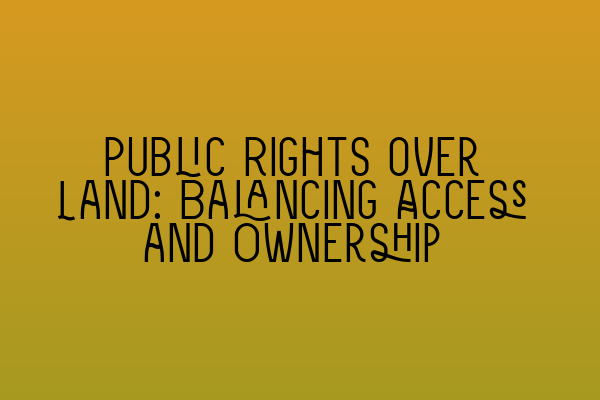Public Rights over Land: Balancing Access and Ownership
At SQE Property Law & Land Law, we understand the complexities and challenges associated with public rights over land. As solicitors specializing in property law, we are well-versed in the legal framework that governs the delicate balance between access and ownership. In this blog post, we will explore the concept of public rights over land, the different types of rights that exist, and the implications for landowners and the general public.
Before delving deeper into the topic, it is essential to understand what public rights over land entail. Public rights refer to the legal entitlements that individuals or groups have to access and use specific areas of land that are in the public domain. These rights are typically granted for the benefit and enjoyment of the general public, ensuring that everyone has equal access to certain spaces.
One example of public rights over land is the right to access public highways or roads. These rights allow individuals to traverse and use the roads freely, without any hindrance from private landowners. Public rights of way are another important aspect of public rights over land. These rights enable individuals to walk or travel along specific routes, such as footpaths, bridleways, or byways, across privately-owned land, ensuring the preservation of traditional routes and heritage.
It is crucial to note that public rights over land do not negate the concept of private ownership. Landowners still maintain full ownership of their land, but they must respect and accommodate certain public rights. This balancing act between private ownership and public access can sometimes result in conflicts and disputes.
Understanding the various types of public rights over land is essential for both landowners and the general public. The most common types of public rights include:
1. Public rights of way: These are legally established routes that allow the public to access and travel across private land on foot, horseback, or bicycle. They are often denoted by signs or markers and are governed by legislation such as the Highways Act 1980.
2. Public access land: Some areas of land, such as open countryside or certain coastal areas, are designated as public access land. These areas allow the public to enjoy recreational activities, such as walking, picnicking, or birdwatching, without any restrictions.
3. Rights to access waterways: Public rights of navigation and fishing allow individuals to access and use waterways, such as rivers, canals, and lakes, for recreational purposes. These rights ensure that water bodies remain accessible to all, regardless of land ownership.
Balancing public rights over land with private ownership can be a complex task, especially when conflicts arise. Disputes between landowners and the general public often center around issues such as access restrictions, maintenance responsibilities, and the preservation of public rights. Resolving these conflicts requires a thorough understanding of the legal framework and a fair and transparent approach.
As solicitors specializing in property law, we can assist both landowners and the general public in navigating these complex issues. Our expertise in land law allows us to offer expert guidance and support in resolving conflicts related to public rights over land. We can help landowners understand their obligations and rights concerning public access while ensuring that the general public’s entitlements are respected and upheld.
In conclusion, public rights over land play a vital role in ensuring equal access and enjoyment of certain spaces for the general public. Balancing these rights with private ownership requires a nuanced understanding of the legal framework and a fair approach. At SQE Property Law & Land Law, we are committed to providing expert guidance and support in navigating the complexities of public rights over land. Contact us today to discuss your specific requirements and find out how we can assist you.
Related Articles:
– Understanding Contractual Capacity: Rights and Limitations
– Interactive SQE Mock Tests for Contract Law: Test Your Knowledge
– Join Our SQE Contract Law Webinars: Expert Insights and Guidance
– SQE Prep: Mastering the Essentials of Contract Law
– Contractual Capacity: Understanding Legal Competence in Contracting Parties
